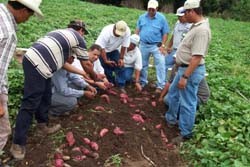
Challenge
Small farmers in Honduras have traditionally planted corn, beans and coffee, mostly for subsistence. Any surplus was sold on the local market, earning small profits. With the possible ratification of international trade agreements, Honduran small farmers need to become more competitive to remain viable and profitable in the global marketplace. And while sweet potatoes were traditionally grown in small volumes for the local market, farmers did not have international networks or the expertise to produce a high-quality crop.
Initiative
Since 2000, USAID has supported Honduran small farmers by providing assistance in marketing, post harvest handling, production, processing and technology. In sweet potatoes, USAID saw an opportunity for small growers to take advantage of the potential for export to nontraditional markets. USAID identified buyers in the Netherlands and Canada and began working with a group of small farmers, including Enrique López, from San Antonio in northern Honduras. Enrique used to grow coffee, but his land was not well suited for it, and he sold it at low prices. USAID helped Enrique diversify production and access new markets. After learning new technologies like drip irrigation and crop scheduling, Enrique planted 3.2 acres of sweet potato and obtained his first harvest in July 2004.
Results
During his first year of planting sweet potato, Enrique’s profits increased by more than 60 percent. His produce was of such high quality that USAID helped him sign a contract with an exporter to plant 2.4 acres every two months. By September 2004, 45 small growers had joined the sweet potato program and 520,000 pounds had been shipped to Europe. Each grower makes an average of $1,350 per hectare in profits, and the program has generated 150 new jobs. The program is set to expand in 2005 to provide opportunities to even more Honduran farmers.







Comment
Make a general inquiry or suggest an improvement.